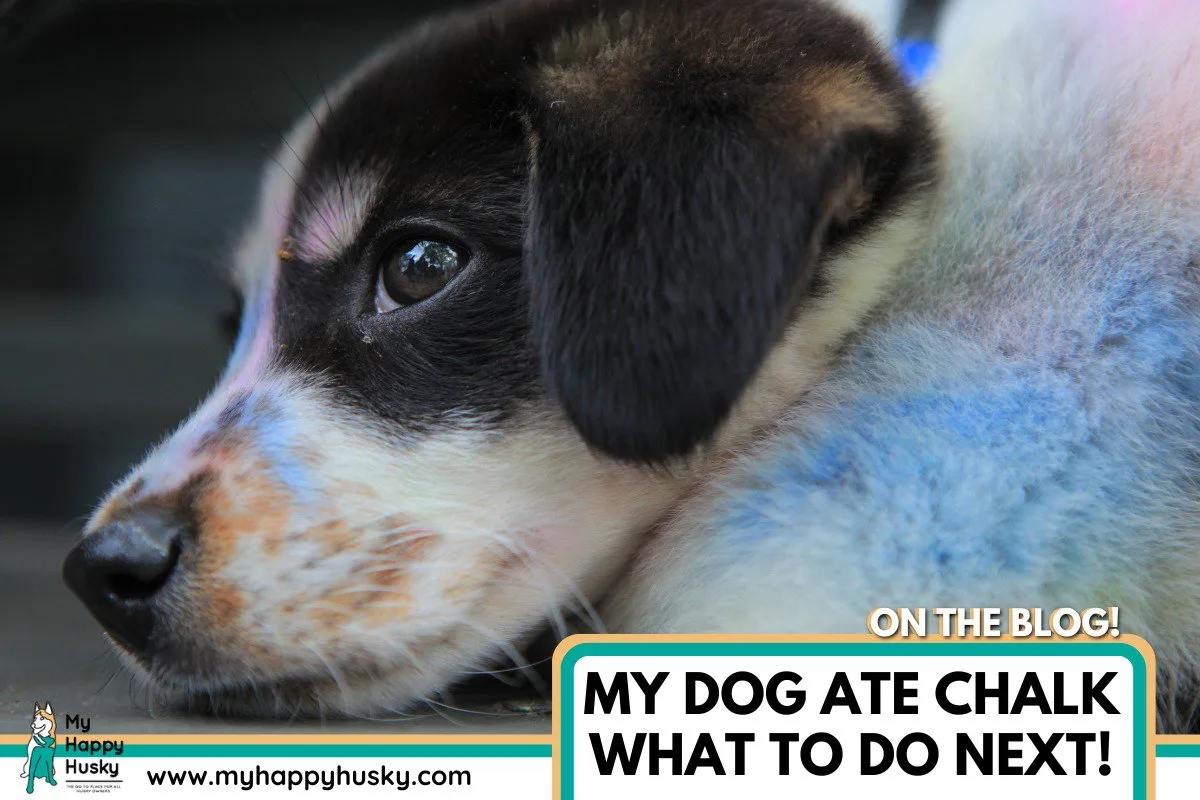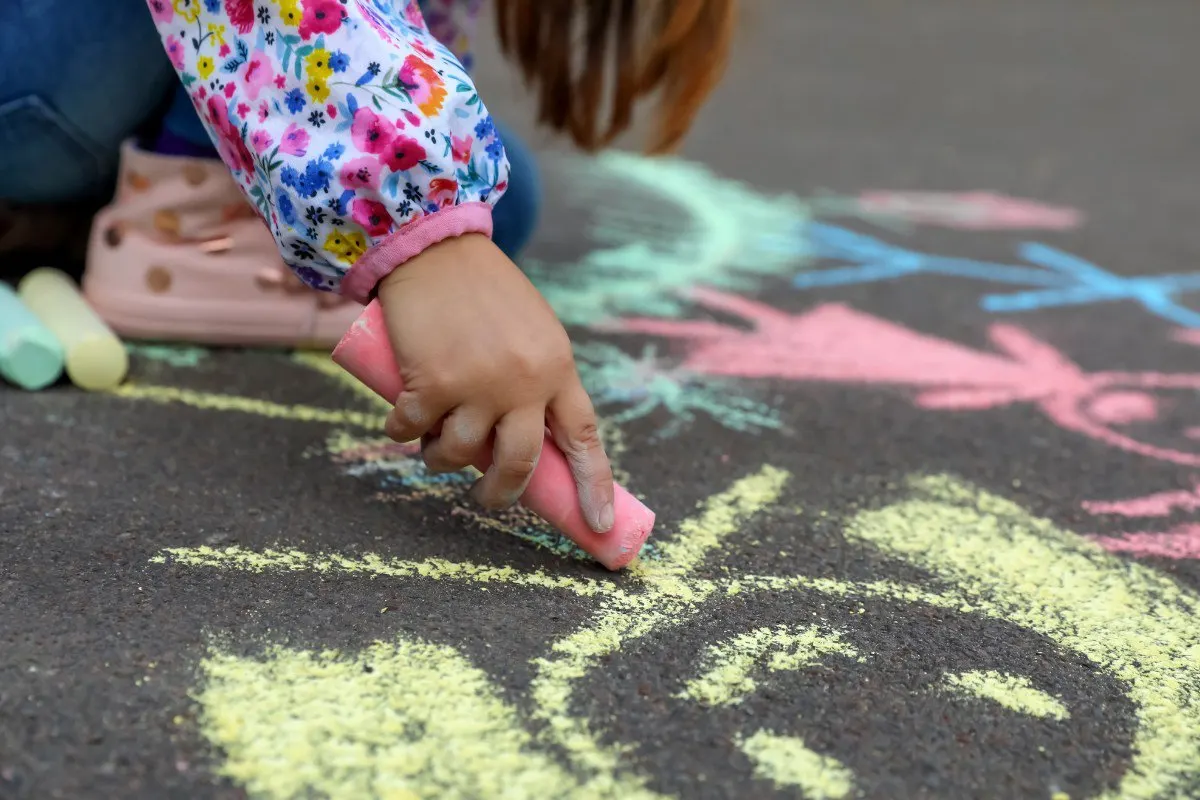So, you’ve found yourself in a bit of a situation… Fido has chomped down on some chalk and now you’re wondering, “Is this something to panic about?”
First off, let me reassure you: chalk is generally considered to be non-toxic to dogs.
But, like all things dog-related, it’s a bit more nuanced than that. Let’s break it down.
What we cover:
- Types of chalk and their ingredients
- When to worry
- What to do if your dog eats chalk
- Other important considerations
- When to see a vet
- Final thoughts

Types of Chalk and Their Ingredients
When we talk about chalk, we’re often thinking of several different types:
- Traditional white chalk used in classrooms
- Colored chalk for sidewalk art
- Chalk used for rock climbing or gymnastics.
Traditional white chalk is usually made of calcium carbonate, which is pretty much harmless if ingested in small amounts.
Colored chalk, on the other hand, can have various dyes and additives, but these are usually non-toxic as well.
That said, specialized chalks used for athletic purposes might contain other substances that could be less friendly to your furry friend.
To be safe, always check the packaging for any warning labels or hazardous ingredients. Websites like PetMD or ASPCA have comprehensive lists of toxic substances to keep away from pets.
When to Worry
Although chalk is usually safe, eating a large amount could potentially lead to some mild gastrointestinal upset.
We’re talking diarrhea or vomiting, nothing too serious but enough to make your pup uncomfortable. Also, colored chalk may produce some—let’s say—“vibrant” poops.
While most chalk is considered safe, it’s always better to err on the side of caution. If your dog has a pre-existing condition, or if you’re noticing severe symptoms, consult your vet immediately.
The ASPCA Animal Poison Control Center is also a reliable source for emergency situations.

What To Do If Your Dog Eats Chalk
First things first: don’t panic.
Take the chalk away from your dog and make sure they have plenty of fresh water to drink.
It’s unlikely to be an emergency situation, but monitoring your dog for any symptoms is always a good idea.
If your dog has only eaten a small piece, they’re most likely going to be just fine. Just keep an eye out for any signs of gastrointestinal upset.
If symptoms persist or if you’re just overly concerned, a quick call to the vet won’t hurt. Some vets even suggest feeding a bland diet—like boiled chicken and rice—for a day or so to settle their stomach.
Read more: My Dog Gorged on Food… What To Do Next
Other Considerations: Size of the Dog and Chalk Alternatives
Great point! There are a couple more aspects worth touching on. Let’s dive into those.
Size Matters: Small Dogs vs. Large Dogs
You know how they say “size matters”? Well, it’s especially true when it comes to dogs and ingesting foreign objects. The size of your dog can influence how their body reacts to eating chalk.
Small dogs are generally more susceptible to gastrointestinal upset from foreign substances simply because of their smaller size.
A small piece of chalk may not be a big deal for a Labrador but could be more problematic for a Chihuahua.
For large breeds, the occasional small nibble on chalk probably won’t be an issue. But even for them, ingesting large quantities is still a no-go.
Always monitor your dog for any symptoms and consult your vet if you’re in doubt.
Popular: Do Dog’s Circle Before Dying? (The Truth)
Chalk Alternatives for Outdoor Fun
Let’s face it, dogs love to be involved in whatever we’re doing. If you’re out drawing on the sidewalk, they’ll want to be right there with you.
So, how about some dog-safe alternatives to keep the fun going?
Look for pet-friendly, non-toxic paints or markers designed specifically for outdoor use.
Companies are catching on to our desire to include our pets in all aspects of our lives and are developing safe alternatives. Websites like Chewy or even your local pet stores may carry these products.
Additional Precautions
Last but not least, make it a habit to store chalk and other art supplies out of your dog’s reach.
Even if chalk is relatively safe, other items like oil-based paints or certain glues could be hazardous.
In short, it’s better to prevent the problem in the first place.
Dog-proofing your home isn’t just about baby gates and electrical outlet covers; it’s also about making sure that everything from food to art supplies is paw-proofed.
When to See a Vet
Okay, let’s talk about the big question: When should you actually rush to the vet?
Unusual Symptoms or Behavior
If your dog eats chalk and starts showing symptoms that are out of the ordinary for them, it’s a sign you should consult a vet. We’re talking excessive drooling, repeated vomiting, or signs of distress like whining or pacing.
Keep in mind that dogs can’t tell us when they’re feeling unwell. Sometimes, behavioral changes might be the only clue. Always trust your instincts; you know your dog better than anyone else.
Special Health Conditions
Got a dog with a sensitive stomach or other pre-existing health conditions? Then even something as minor as eating chalk could potentially cause complications. For dogs with specific health issues, always err on the side of caution and call the vet right away.
Large Quantities Consumed
If your dog has eaten a lot of chalk—like, they’ve turned your art project into an all-you-can-eat buffet—it’s a good idea to consult your vet. Ingesting large quantities can be hard on your dog’s digestive system and may require intervention.
Websites like the ASPCA Animal Poison Control Center or PetMD often emphasize the risks associated with ingesting large amounts of even non-toxic substances. So, in these cases, it’s better to be safe than sorry.
Final Thoughts
So to wrap it up, chalk is generally safe for dogs if ingested in small amounts.
Just like with kids, though, it’s not something you’d want them to make a meal out of.
Keep chalk and other similar items out of your dog’s reach whenever possible, and always supervise them during playtime, especially when new items are introduced.
Remember, when in doubt, consult your vet or a credible source like the ASPCA Animal Poison Control Center. Here’s to happy and safe playtime with our furry friends!
Disclaimer
The advice given in this article is for educational purposes only and does not constitute professional advice in any context. Before making any decisions that may affect the health and/or safety of your dog, you should always consult a trained veterinarian in your local area. For the FULL disclaimer Visit HereCopyright Notice: The content produced and published on My Happy Husky is unique and original. My Happy Husky makes an active effort to search for plagiarized content using plagiarism detection software. If plagiarized content is found, action will be taken.
